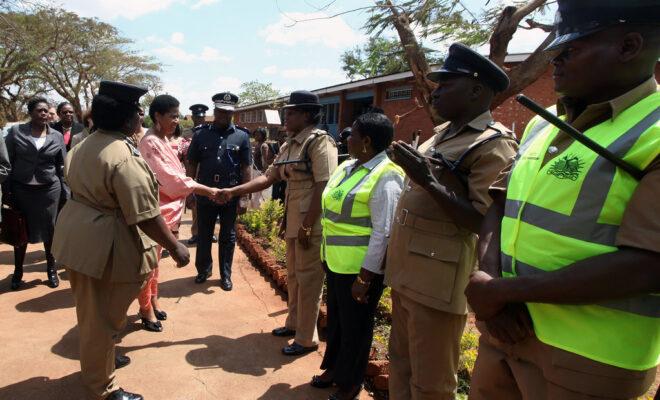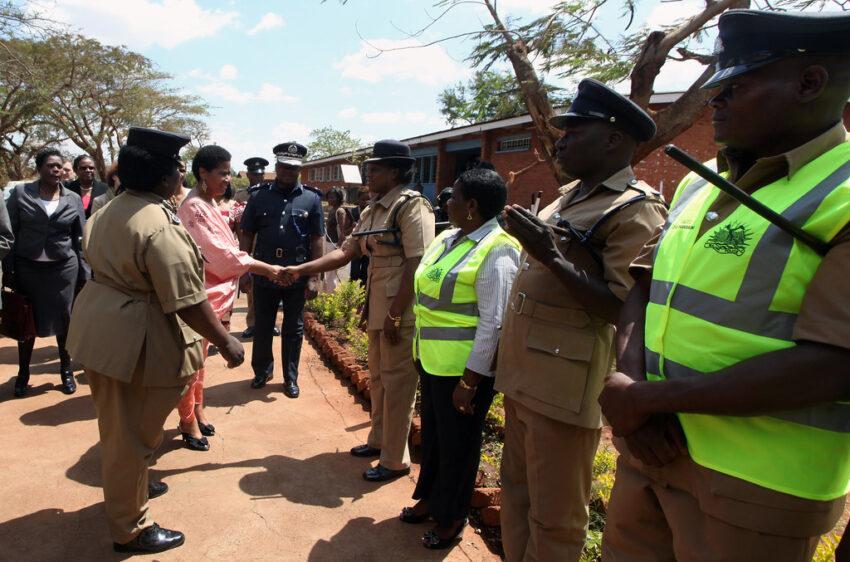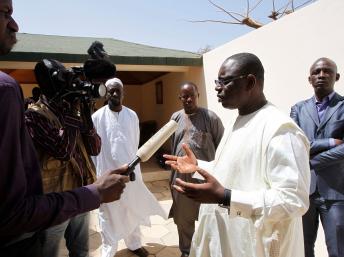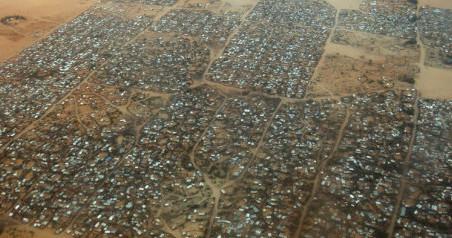No one knows if crime in Malawi is rising or falling, not even the police

Because the police either don’t collect or release reliable crime statistics, citizens are in the dark.

UN Women’s Phumzile Mlambo-Ngcuka greeting officers of the Malawi Police at in Lilongwe, Malawi. Credit: Maria Thundu
In 2020, Malawi was featured in the New York Times series, “The World Through a Lens”, which features photos from “some of our planet’s most beautiful and intriguing places”. Then a resident of the country, I was happy to see Malawi highlighted in such a way. The piece was generally innocuous; several friends shared the accompanying photos on social media. I was surprised at one line, however, especially from a writer who claimed to be “wary of clichés and generalizations” – namely that since the author’s first visit 14 years earlier, “crime has risen dramatically”.
As a lawyer seconded to the Malawi Police Service, I spent over three years listening to police officers, visiting police cells, and reading research and local journalism about crime. There is no reliable evidence that crime has increased between 2006 and 2020. In fact, there is little evidence either way. The Malawi Police Service does not collect reliable crime statistics or make such information public, or some combination of the two.
What we know
We do know some things. In 2006, Malawi’s homicide rate per 100,000 people was 6.3. In 2012, the last year for which the UN Office on Drugs and Crime (UNODC) has data, the rate was 1.8, a more than 70% drop. We also know that at Lilongwe Model Police Station, the number of arrests decreased every year from 2017 to 2020. This trend didn’t last into 2021, largely thanks to arrests driven by Covid-19 regulation violations and “sweeping” exercises. Finally, we can see from data collected by the World Prison Brief that the number of prisoners as a proportion of Malawi’s population peaked in 2006.
More circumstantial evidence comes from Malawian responses to Afrobarometer surveys, some of which seems to point in opposite directions. On the one hand, the proportion of Malawian respondents who rank crime and security as a top three priority for the country has fallen slightly from 7% in 2005 to 6.3% in 2019.
On the other, there was a nine-point increase between 2005 and 2014 of both people saying something had been stolen from their house in the past year and respondents reporting that someone in their family had been physically attacked in the previous 12 months. Additionally, the proportion of Malawians who said the government was doing fairly or very badly at reducing crime increased from 46% in 2005 to 63.3% in 2019.
The police itself reveals crime figures when it serves their institutional interests. They share quarterly figures of year over year crime when it suits them. This kind of data is inadequate at best at identifying trends, and the Malawian police rarely consider the possible reasons for changes such as population growth, the political environment, or the underreporting of crime. According to the 2004-2005 census, the reporting rate for assault was just 17%; Afrobarometer’s 2012 survey found a reporting rate of all crime of 36%. And year-over-year or quarter-over-quarter figures are inadequate, at best.
The importance of being transparent
As noted in the Washington Post’s Monkey Cage, “evidence points to a link between transparency and citizens’ perceptions of government corruption”. The latter is high in Malawi. President Lazarus Chakwera has vowed to change this and “end the era of government secrecy and usher in the dawn of government accountability”, in part by bringing the Access to Information Act, 2017 into force. But the Malawi Police Service has a role to play too.
In the spirit of transparency and to ensure accountability, the police should regularly share and publish information about: 1) the demographics and size of the police service, including the number of officers who leave the police each year and the various reasons why; 2) the number and type of complaints received against officers and the disposal of those complaints; 3) information around police uses of force, at minimum whenever bullets or tear gas are discharged; 4) comprehensive statistics about reports made to the police, arrests made, cases prosecuted, bailed and diverted, and the number of individuals sentenced; and 5) the number of traffic stops made, tickets issued, and monies collected.
To ensure accurate reporting and hold government and civil servants responsible, the Malawian Constitution and the Access to Information Act explain that governments and institutions must be transparent. Malawians deserve more than patchy data and circumstantial evidence. They deserve to know how much crime is present in the country as well as what and how their police are acting to address public safety. They deserve to know, amongst other things, if crime is indeed rising or falling.






